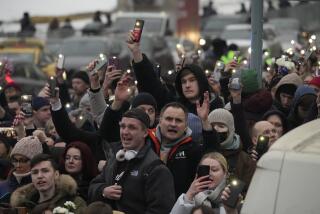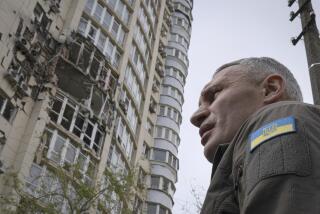SOVIET UNION / HOLIDAY HASSLE : Move to Cancel Revolution Day Sparks New Revolt
- Share via
MOSCOW — To some Soviet citizens, the mayors of Moscow and Leningrad are Grinches trying to steal their favorite holiday.
To others, the two men are fighting the powerful Communist propaganda that for decades held all Soviet public life in its totalitarian grip.
When Gavriil K. Popov of Moscow and Anatoly A. Sobchak of Leningrad called last month for the cancellation of most celebrations of Revolution Day, the crown of Communist ritual suddenly became a nationwide controversy.
With the Nov. 7 holiday less than three weeks away, much of the country still does not know whether the traditional cheering marches through city squares, the fireworks and the displays of giant portraits of Bolshevik leader V. I. Lenin will occur this year.
The usual military parade, that show of the nation’s armed might rumbling past waving leaders in Red Square, appears certain, but only because President Mikhail S. Gorbachev issued a special decree. But the rest of the celebrations, marking the anniversary of the 1917 Bolshevik Revolution, are in some doubt--to the pained outrage of many party officials.
“It’s like if your people wanted to abolish the Fourth of July,” Sergei A. Popov, the deputy chief of the ideology department in Moscow’s Communist Party, said, “or if they wanted to forbid people from carrying flags around.”
The party’s Central Committee secretariat huffed in a recent statement that “any attempts to deprive the people of their main, nationwide holiday, which has become an organic part of every Soviet home, of every family, are invalid and inappropriate.”
The best part of the holiday for most people, a four-day weekend replete with extra stocks of consumer goods in the stores and special theater performances, remains unthreatened. But the fight over the political side of Revolution Day reflects the party’s increasingly embattled position, and the turnout will show just how much support it has lost. About 800,000 of the party’s 18 million members have quit this year.
Vladimir Boxer, a leader of the Moscow Union of Voters, which has organized most of the big protests seen in the capital this year, backed the mayors’ call as a sensible step in view of the growing anti-Communist sentiment. Those who still rejoice at the course of Soviet communism are “a definite minority,” he said.
In Moscow and Leningrad, as well as other cities, party officials are resisting the two mayors’ appeal and calling for citizens to come out for marches anyway.
In the independence-minded Baltic republic of Latvia, where Nov. 7 is no longer an official holiday, lawmakers declared this week that they also would refuse to obey the presidential decree on the military parade. The Armenian Parliament on Thursday did the same.
If the Moscow party goes ahead with its celebrations, Boxer said his group will probably arrange a counter-protest, as it did last year, when at least 5,000 people formed an “alternative column” carrying largely anti-Communist slogans. On May Day, the other major political holiday, protesters marching through Red Square booed Gorbachev and other leaders.
Mayors Popov and Sobchak have said they are concerned about unrest that might be sparked by such gatherings. But the main reason they gave for their stand was the lack of anything to celebrate: “The whole current situation--the economic crisis, difficulties with the harvest, shortages and lines--does not predispose people to any jubilation.”
Boxer said he is not worried that the country would lose part of its culture if Communist rituals were dropped.
“Nov. 7 had no deeply rooted traditions anyway,” he said. “It was only mainly an excuse to drink.”
More to Read
Sign up for Essential California
The most important California stories and recommendations in your inbox every morning.
You may occasionally receive promotional content from the Los Angeles Times.









